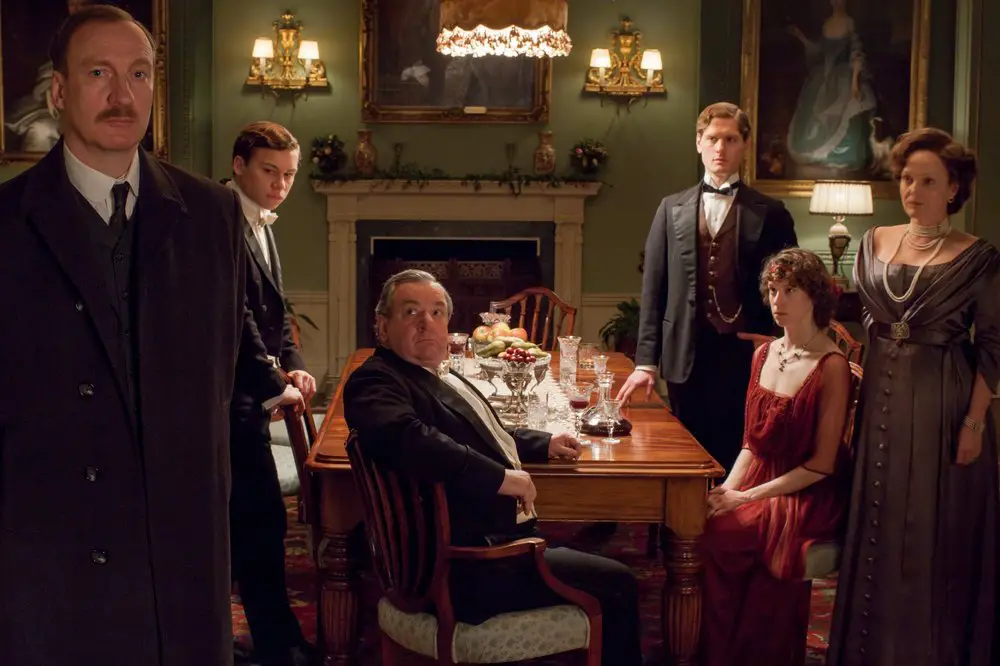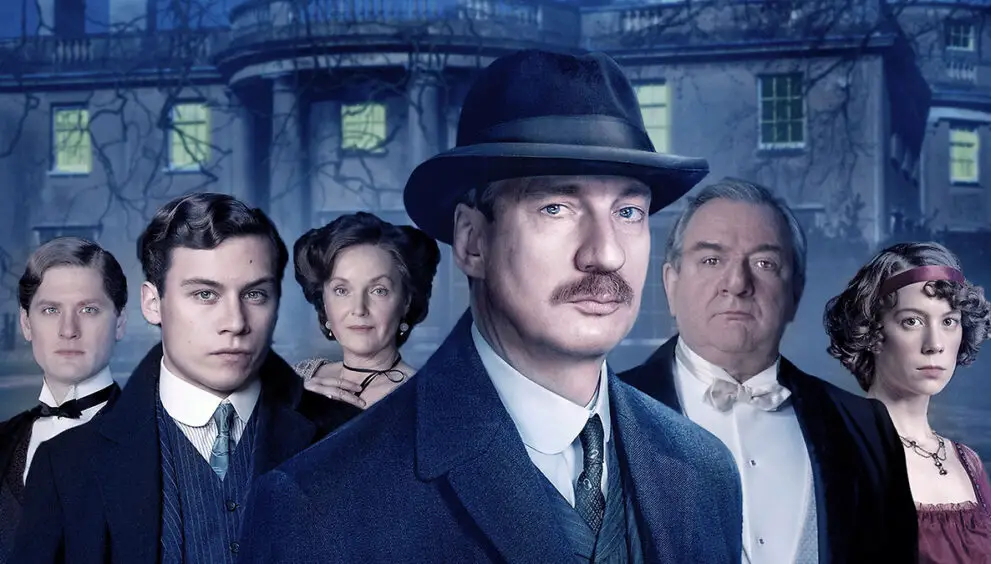Welcome to our captivating article on the top 10 quotes from J.B. Priestley‘s renowned play, “An Inspector Calls.” This thought-provoking masterpiece delves deep into the themes of social responsibility, morality, and the consequences of our actions.
As we dissect these powerful Inspector Calls quotes, you will gain invaluable insights into the characters, their motivations, and the overall message of the play.
Immerse yourself in the gripping dialogue that has captivated audiences for decades. Each selected quote will be examined in detail, highlighting its significance and relevance to the larger narrative.
Whether you are a fan of dramatic literature, a student studying the play, or simply seeking intellectual stimulation, this article will provide you with a profound understanding of “An Inspector Calls” and its enduring impact.
We’ve rounded up the top 10 quotes from the play that encapsulate its themes and messages, and we’ll be analyzing how they contribute to the play’s lasting legacy.
So, let’s dive into this thought-provoking and timeless play!
Introduction to An Inspector Calls
An Inspector Calls is a play that has captivated audiences for over 70 years, with its piercing examination of social responsibility, morality, and the consequences of our actions. Written by J.B. Priestley in 1945, the play is set in 1912, just before the start of the First World War.
It tells the story of the Birling family, a wealthy and influential family, whose lives are thrown into disarray after they receive a visit from Inspector Goole.
The Inspector is investigating the suicide of a young woman named Eva Smith and soon discovers that each member of the Birling family has played a role in her untimely death.
The play is a scathing critique of the class system in early 20th century England. The Birlings, who represent the upper class, are shown to be callous and indifferent to the suffering of those beneath them. Eva Smith, who comes from a lower class background, is used as a symbol of the working class and the injustices they face.
The play highlights the stark contrast between the luxurious lifestyle of the Birlings and the poverty and hardship faced by those at the bottom of society.
Brief Synopsis of the Play
The play begins with the Birling family celebrating the engagement of daughter Sheila to Gerald Croft, the son of a business rival. However, their celebrations are cut short when Inspector Goole arrives to question the family about Eva Smith’s suicide.
Through a series of flashbacks, we learn that each member of the family had a connection to Eva and their mistreatment of her played a role in her death. The play ends with the realization that the Inspector may not be what he seems, and the Birling family’s comfortable existence is shattered forever.
The play’s structure is unique in that it takes place over the course of a single evening. This compressed timeline adds to the tension and urgency of the play, as the audience watches the Birlings’ world unravel in real time.
The use of flashbacks also allows the audience to see the events leading up to Eva’s death from multiple perspectives, giving a fuller and more nuanced understanding of the characters and their motivations.
Importance of Quotes in Understanding the Themes
Throughout the play, J.B. Priestley uses powerful and thought-provoking quotes to explore the themes of social responsibility, morality, and the consequences of our actions.
These quotes are essential to understanding the messages of the play and its lasting legacy.
In the next section, we’ll be exploring the top 10 quotes from An Inspector Calls and analyzing their impact.
One of the most memorable quotes from the play is when Inspector Goole says,
“We don’t live alone. We are members of one body. We are responsible for each other.”
This quote encapsulates the central theme of social responsibility and highlights the interconnectedness of all people. It is a reminder that our actions have consequences and that we must consider the impact they have on others.
Another powerful quote from the play is when Sheila Birling says,
“But these girls aren’t cheap labour – they’re people.”
This quote challenges the dehumanization of the working class and emphasizes their humanity. It is a reminder that those who are less fortunate than us are not objects to be used for our benefit, but individuals with their own hopes, dreams, and struggles.
The play’s enduring popularity is a testament to its timeless themes and thought-provoking messages. It continues to be performed around the world and is studied in schools and universities as a masterpiece of 20th century literature.
An Inspector Calls is a powerful reminder of the importance of social responsibility and the consequences of our actions, and its impact will continue to be felt for generations to come.

The Most Memorable Quotes from Key Characters
Inspector Goole’s Powerful Statements
“We don’t live alone. We are members of one body. We are responsible for each other.”
“If men will not learn that lesson, then they will be taught it in fire and blood and anguish.”
“One Eva Smith has gone but there are millions of Eva Smiths and John Smiths still left with us, with their lives, their hopes, and their fears.”
Inspector Goole is a powerful and enigmatic character whose statements carry a weighty significance in the play.
These quotes highlight the Inspector’s message that we are all connected and responsible for one another, and that failure to recognize this fact will have grave consequences.
His words are a warning to the audience that the pursuit of individual gain at the expense of others will lead to destruction and chaos.
The Inspector’s message is one of unity and compassion, and his words serve as a reminder that we must work together to create a better world for all.
Arthur Birling’s Capitalist Views
“The Titanic- she sails next week- forty-six thousand eight hundred tons- New York in five days- and every luxury- and unsinkable, absolutely unsinkable.”
“A man has to mind his own business and look after himself and his own- and-“
Arthur Birling is a wealthy and influential businessman who represents the capitalist elite in the play. These quotes reveal his narrow-minded and selfish views, which prioritize profit and self-interest above all else.
Birling’s character serves as a warning about the dangers of unchecked greed and the pursuit of wealth at any cost. His lack of concern for the welfare of others, especially those in lower social classes, is a reflection of the capitalist ideology that dominated the early 20th century.
His words highlight the need for a more equitable and just society, where the needs of all individuals are taken into account, not just those in positions of power and privilege.
Sheila Birling’s Transformation
“But these girls aren’t cheap labor- they’re people.”
“I’ll never, never do it again to anybody.”
Sheila Birling is a central character in the play, and her transformation from a spoiled and privileged young woman to a compassionate and empathetic individual is one of the play’s defining moments.
These quotes reveal her realization that the working-class women in her society are not disposable objects to be exploited for profit but individuals with their own hopes, dreams, and fears.
Her statement at the end of the play that she has learned her lesson and will never treat anyone poorly again elevates her to a position of moral authority.
Sheila’s transformation is a powerful statement about the potential for growth and change in individuals. Her journey serves as an inspiration to others to examine their own beliefs and actions and work towards becoming more compassionate and understanding individuals.
Eric Birling’s Guilt and Regret
“My God! I’m not likely to forget.”
“I did what I did. And Mother did what she did. And the rest of you did what you did to her.”
Eric Birling is the youngest member of the Birling family, and his struggle with guilt and regret over his role in Eva’s death is one of the play’s most compelling subplots. These quotes reveal his recognition of his wrongdoing and his sense of responsibility for his actions.
Eric’s character serves as a reminder that actions have consequences, and that we must take responsibility for our mistakes.
His journey towards redemption is a powerful statement about the potential for growth and change in individuals, and his story serves as a reminder that it is never too late to make amends.
Sybil Birling’s Cold-hearted Nature
“I’m sorry she should have come to such a horrible end. But I accept no blame for it whatsoever.”
“We have to share something. If there’s nothing else, we’ll have to share our guilt.”
Sybil Birling is the matriarch of the Birling family, and her cold-hearted and unsympathetic nature is one of the play’s most disturbing traits. These quotes reveal her unwillingness to accept her role in Eva’s death and her lack of empathy for others.
Sybil’s character serves as a warning about the dangers of selfishness and a lack of compassion. Her unwillingness to accept responsibility for her actions and her lack of empathy for others is a reflection of the callousness that can result from a life lived in privilege and comfort.
Her story serves as a reminder that we must always strive to be kind and understanding towards others, regardless of their social status or circumstances.
Gerald Croft’s Struggle with Morality
“I didn’t feel about her as she felt about me.”
“I must have a drink. I’m steady again now.”
Gerald Croft is Sheila’s fiancé, and his struggle with morality and responsibility is a key part of the play’s storyline. These quotes reveal his unwillingness to take responsibility for his actions and his tendency to bury his guilt and discomfort behind alcohol.
Gerald’s character serves as a warning about the dangers of moral ambiguity and the tendency to prioritize personal comfort over moral responsibility.
His journey towards self-reflection and growth is a powerful statement about the potential for change in individuals, and his story serves as a reminder that we must always strive to do what is right, even when it is difficult or uncomfortable.
Analyzing the Impact of the Quotes
How the Quotes Reflect the Play’s Themes
Each of the quotes we’ve discussed so far is integral to understanding the play’s themes of social responsibility, morality, and the consequences of our actions. Inspector Goole’s statements emphasize the societal responsibility we have to one another and warn of the dangers of neglecting this responsibility.
He speaks of the “fire and blood and anguish” that will result if society does not change its ways and recognize the interconnectedness of all people.
Arthur Birling’s quotes highlight the selfish and shortsighted nature of capitalism and the need for a more collective and compassionate society.
He boasts about his business success and dismisses the idea of social responsibility as “nonsense.” Sheila’s statements reflect her transformation from a spoiled and selfish individual to a responsible and empathetic one. She recognizes her role in Eva Smith’s death and expresses deep regret for her actions.
Eric’s quotes reveal his recognition of his mistakes and his sense of guilt and regret. He speaks of the need for individuals to take responsibility for their actions and to make amends for the harm they have caused. Sybil’s quotes expose her lack of empathy and unwillingness to accept responsibility for her actions.
She refuses to acknowledge her role in Eva’s death and insists that the blame lies solely with the girl herself.
Finally, Gerald’s quotes highlight the struggle between self-interest and personal responsibility.
He initially tries to distance himself from the situation and protect his own reputation, but ultimately recognizes the need to take responsibility for his actions and the harm he has caused.
The Role of Social Responsibility in the Quotes
All of the quotes we’ve discussed emphasize the importance of social responsibility and of recognizing the connections we have to one another.
They warn of the dangers of selfishness and short-sightedness and point towards a more collective and empathetic society as the answer.
The play suggests that individual actions have broader consequences and that we must all take responsibility for creating a just and equitable society.
The Quotes’ Connection to the Historical Context
While An Inspector Calls is set in 1912, just before the start of World War I, its themes and messages are timeless and have continued relevance today.
The quotes we’ve discussed reflect the struggles of the working class against the wealthy and powerful elite, a struggle that is just as relevant today as it was almost 100 years ago.
The play also speaks to the broader societal changes taking place during the early 20th century, including the rise of socialism and the push for greater social justice.
The quotes remind us that the fight for a more equitable and compassionate society is ongoing, and that we must all do our part to create a better world.
Conclusion: The Lasting Legacy of An Inspector Calls
The Timelessness of the Play’s Messages
An Inspector Calls is a play that has stood the test of time and remains as relevant today as it was when it was first written. Its messages of social responsibility, morality, and the consequences of our actions are timeless and apply to any society. The quotes we’ve analyzed in this article highlight the power of language and the importance of recognizing our roles in society.
The Continued Relevance of the Quotes Today
The top 10 quotes from An Inspector Calls we’ve analyzed in this article remain powerful and thought-provoking in today’s world. As we continue to grapple with issues of social inequality, poverty, and environmental destruction, the themes and messages of the play remain as relevant as ever.
It is up to us to heed the Inspector’s warning and recognize that we are all members of one body, responsible for each other, and that failure to recognize this fact will have grave consequences. Let us learn from the lessons of An Inspector Calls and strive for a more compassionate, empathetic, and just society.
In conclusion, “An Inspector Calls” resonates with audiences due to its timeless themes and memorable quotes. The selected top 10 quotes we explored offer glimpses into the moral complexities of the characters and the social commentary embedded within the play.
From the Inspector’s admonitions to the Birling family’s unraveling secrets, these quotes serve as powerful reminders of the consequences of our actions and the importance of empathy and social responsibility.
Whether you’re revisiting the play or discovering it for the first time, these quotes offer profound insights and provoke contemplation about our society’s values.
By immersing ourselves in the words of J.B. Priestley, we are reminded of the power of theater to illuminate and challenge our understanding of the human condition.
Prepare to be captivated by the unforgettable quotes from “An Inspector Calls” and embark on a journey of introspection and intellectual exploration.




